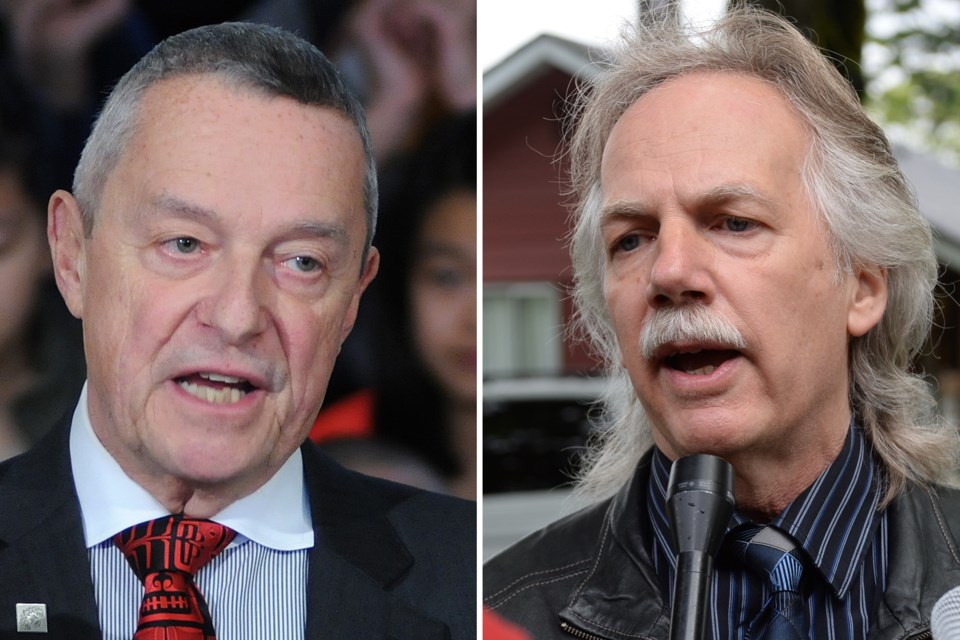Education Minister Peter Fassbender stopped short of saying the government wouldn’t agree to binding arbitration with the teachers’ union, Friday afternoon. Instead, he said he and the B.C. Public School Employers’ Association need to see details in writing.
B.C. Teachers’ Federation president Jim Iker announced Friday morning the BCTF would ask teachers to end the strike if the government and the B.C. Public Schools Employer’s Association agree to binding arbitration.
Fassbender doesn’t like the idea of third parties making decisions he says teachers, BCPSEA and the government should make.
“The one and only option that I believe strongly makes sense, is for both parties to be at the table, for the B.C. Teachers’ Federation to become realistic in their wage and benefit proposals and then for us to negotiate and mediate the other items that are still at the table,” Fassbender said at the start of his address at the press theatre in Victoria.
“We are not prepared to say to someone else, well you make our decisions for us,” he added near the end of his statement. “I challenge the BCTF again to work with us to come to that place and to be willing to make the hard decisions and take that forward to their membership.”
Fassbender said Iker called BCPSEA’s chief negotiator, Peter Cameron, five minutes before the BCTF press conference and provided no details about the federation’s bid for binding arbitration.
“I do hope we get those [details] in writing so we can look at that,” Fassbender said.
Iker had presented binding arbitration as the fastest and fairest way to get kids back in classrooms.
The BCTF proposes to send matters of compensation, benefits and preparation time to binding arbitration. Compensation includes salaries and a potential signing bonus.
Iker says the BCTF will largely leave matters related to class size and composition before the courts although they could be negotiated concurrently with binding arbitration.
The BCTF wants the government and BCPSEA to strike the E80 proposal that Iker maintains would supersede a Court of Appeal decision.
But Fassbender said E80 is open to change and negotiation.
“It was not and is not, clearly, any attempt to compromise any of the teachers’ rights,” Fassbender said of E80.
He said he told Iker last week any negotiated agreements made now wouldn’t compromise the outcome of the court case.
The sentence that worries the BCTF in the E80 proposal reads: “Note: These provisions superseded and replace all previous Articles that addressed class size, composition and staffing levels.”
The B.C. Supreme Court has twice ruled the government illegally stripped language about class size and composition from teachers’ contracts. The case is now at the Court of Appeal. Fassbender said the case could progress to the Supreme Court of Canada and not be decided for four or five years.
Premier Christy Clark called for teachers to end the strike at a press conference Wednesday. She said classroom composition is the most important issue so the BCTF should agree with BCPSEA proposal on wages and benefits so negotiations can focus on this most important concern.
The government has tabled $375 million over five years to improve classroom composition.
But Iker has said $75 million a year isn’t new money and isn’t adequate to improve problems that have intensified each year since 2002, when language about class size and composition was stripped from the teachers’ contract. He has noted $15 million of the $75 million will go to CUPE workers, such as special education assistants, instead of teachers.
The BCTF dropped limits related to class size and composition in June in favour of two funds. It proposed $175 million for the first year, a stable $225 million thereafter to improve classroom learning, with local boards, unions and teachers to decide how the money would be spent.
The BCTF also proposed a $100-million fund to deal with grievances that could flow from court decisions. Iker said the fund would be akin to how the government settled with the Hospital Employees Union for $75 million in 2008.
Fassbender said he’d spoken to representatives of the B.C. Confederation of Parent Advisory Councils Thursday and they and he believe the model for class composition shouldn’t return to that of the 1990s. Fassbender said the BCTF, parents and “other partners who can bring support in the classrooms” need to work out a new model together.
“But I clearly know that has to be a cooperative route,” he said. “I can’t be a one-sided proposition. And that’s why we have clearly said we are prepared to negotiate that.”
The need for a cooperative route is also why he says government won’t legislate teachers back to work.
“I know the way we’ve done it in the past has not proven to provide any stability or solutions and until we get there, the system stays at risk,” Fassbender said. “And I don’t think it’s worth it. I don’t think parents want that. I don’t believe students want that, and quite honestly, I don’t believe teachers want that.”
Fassbender said binding arbitration has cost taxpayers too much money in the past and that it’s critical that the government balance its budget.
“And by the way, if the decision is that we should raise taxes, that is not acceptable,” he said. “The Premier’s been clear, the Minister of Finance, is this government will not raise taxes in order to provide a settlement to one union that does not reflect what the other public sector has done.”
The Vancouver School Board has been calling for binding arbitration since July and the Vancouver District Parent Advisory Council started calling for binding arbitration at the end of August.
twitter.com/Cheryl_Rossi



